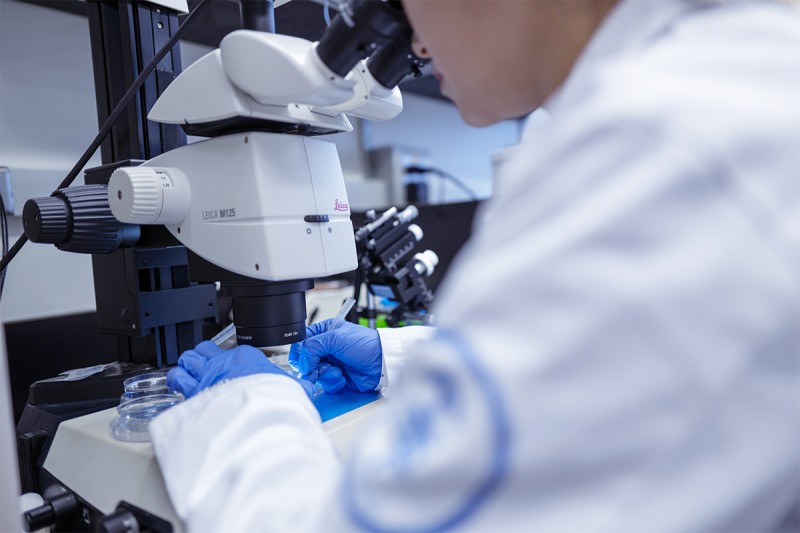
New research from Memorial Sloan Kettering Cancer Center (MSK) and the Sloan Kettering Institute — a hub for basic science and translational research at MSK — finds adherence is a hurdle for home-based colorectal cancer tests; sheds new light on tumor-associated macrophages in glioblastoma; identifies statins as a promising addition to treatment for HER2-positive gastric cancer; and describes how a new single-cell transcriptome atlas opens the “black box” of early human embryo development.
For home-based colorectal cancer tests, adherence is a hurdle
Colorectal cancer screening guidelines include a series of annual fecal occult blood tests or a colonoscopy. The at home tests are considered to be of equivalent effectiveness to a colonoscopy — if patients follow through with all of them. In a recent randomized clinical trial, however, patients were far less likely to complete a series of home-based screenings compared to a single colonoscopy. Adherence for those assigned to the high sensitivity fecal occult blood testing (HSgFOBT) arm of the 3,500 participant, multi-center trial was 38%, compared to 84% in the single-screening colonoscopy arm. The high colonoscopy adherence is in sharp contrast to the much lower observation reported in a study by the Nordic-European Initiative on Colorectal Cancer (NordICC). When performance of the fecal-based tests is suboptimal, colonoscopy should be offered in order to obtain maximum benefit, says study first author and co-principal investigator, Ann G. Zauber, PhD, a biostatistician at MSK. A fecal occult blood test needs to be repeated annually in order to be effective, adds MSK co-author and co-principal investigator Sidney J. Winawer, MD, noting however, that any screening test is better than none — and “the best test is the one that gets done, and done well.” Read more in Gastroenterology.
Research sheds new light on the role of tumor-associated macrophages in glioblastoma
Understanding the tumor immune environment in glioblastoma (GBM) is essential to improving immunotherapy strategies against the aggressive brain cancer. Depleting tumor-associated macrophages (TAMs), however, did not extend survival across several different mouse models of GBM, according to findings led by study first author Mollie Chipman, a graduate student in the lab of senior author Luis Parada, PhD, Director of MSK’s Brain Tumor Center. The results may explain why TAM depletion therapy has not been successful in clinical trials. The experiments did identify several potentially useful insights, however, including indications that monocyte-derived macrophages (MDMs), which help make up GBM TAMs, might be therapeutically harnessed against one type of GMB. Read more in the Proceedings of the National Academy of Sciences.
Adding statins shows promise for improving treatment of HER2-positive gastric cancer
An MSK research team found that adding statins to trastuzumab and targeted radiopharmaceutical therapy showed promise as a method for improving outcomes in HER2-postive gastric cancer. Led by first-author Yi Rao, PhD, a research scholar in the lab of senior author Jason Lewis, PhD, the scientists added lovastatin to the treatment regimen in mouse models in an effort to overcome drug resistance that often develops with trastuzumab. They found the combination was effective at killing cancer cells that had become resistant to the chemotherapy, as well as helping to protect healthy cells from the damage caused by radiation. Since statins are commonly prescribed to cancer patients, the results strongly support the feasibility of clinical studies to evaluate the combination approach in HER2-positive patients, the researchers note. Read more in the Proceedings of the National Academy of Sciences.
Single-cell transcriptome atlas opens ‘black box’ of early human embryo development
The earliest period of human embryo development genesis has largely been a “black box” for developmental biologists. Now research from the Sloan Kettering Institute and collaborators in China have created a single-cell transcriptome “atlas” to provide a compendium of the early progenitor cells that develop into human organs. The work, led by first author Yichi Xu, PhD, a postdoctoral researcher in the lab of co-senior study author Zhirong Bao, PhD, probed the cellular diversity of 4-6 week-old human embryos — the period when organs are just being laid out. Using 180,000 single-cell transcriptomes, the team then generated a comprehensive atlas of 313 cell types in 18 developmental systems, which were annotated with a collection of markers from 157 publications. The atlas provides a benchmark to evaluate how well different models mimic real-world embryonic development, as well as valuable guidance for stem cell engineering for regenerative medicine and for understanding lineage evolution in cancer, the authors note. Read more in Nature Cell Biology.